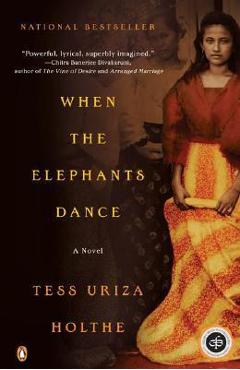When the Elephants Dance - Tess Uriza Holthe

Detalii When the Elephants Dance -
Vânzător
libris.ro
Pret
89.28 Lei
89.28 Lei
99.2 Lei
Categorie (vânzător)
Fiction
Marca
Tess Uriza Holthe
Descriere YEO:
Descriere magazin:
Inspired, in part, by the experiences of her father, this debut novel begins during the final week of the Japanese-American battle for the islands. As they hide in a cellar from the Japanese, several Filipino civilians tell magical tales to help pass the time, fuel their courage, and teach important lessons of hope. Papa explains the war like this: \'When the elephants dance, the chickens must be careful.\' The great beasts, as they circle one another, shaking the trees and trumpeting loudly, are the Amerikanos and the Japanese as they fight. And our Philippine Islands? We are the small chickens. Once in a great while comes a storyteller who can illuminate worlds large and small, magical and true to life. When the Elephants Dance introduces us to the incandescent voice of Tess Uriza Holthe, who sets her remarkable first novel in the waning days of World War II, as the Japanese and the Americans engage in a fierce battle for possession of the Philippine Islands. The Karangalan family and their neighbors huddle for survival in the cellar of a house a few miles from Manila. Outside the safety of their little refuge the war rages on--fiery bombs torch the beautiful Filipino countryside, Japanese soldiers round up and interrogate innocent people, and from the hills guerillas wage a desperate campaign against the enemy. Inside the cellar, these men, women, and children put their hopes and dreams on hold as they wait out the war, only emerging to look for food, water, and medicine. Through the eyes of three narrators, thirteen-year-old Alejandro Karangalan, his spirited older sister Isabelle, and Domingo, a passionate guerilla commander, we see how ordinary people must learn to live in the midst of extraordinary uncertainty, how they must find hope for survival where none seems to exist. They find this hope in the dramatic history of the Philippine Islands and the passion and bravery of its people. Crowded together in the cellar, the Karangalans and their friends and neighbors tell magical stories to one another based on Filipino myth and legend to fuel their courage, pass the time, and teach important lessons. The group is held spellbound by these stories, which feature a dazzling array of ghosts, witches, supernatural creatures, and courageous Filipinos who changed the course of history with their actions. These profoundly moving stories transport the listeners from the chaos of the war around them and give them new resolve to

When the Elephants Dance - - Disponibil la libris.ro
Pe YEO găsești When the Elephants Dance - de la Tess Uriza Holthe, în categoria Fiction.
Indiferent de nevoile tale, When the Elephants Dance - Tess Uriza Holthe din categoria Fiction îți poate aduce un echilibru perfect între calitate și preț, cu avantaje practice și moderne.
Preț: 89.28 Lei
Caracteristicile produsului When the Elephants Dance -
Comandă When the Elephants Dance - Online, Simplu și Rapid
Prin intermediul platformei YEO, poți comanda When the Elephants Dance - de la libris.ro rapid și în siguranță. Bucură-te de o experiență de cumpărături online optimizată și descoperă cele mai bune oferte actualizate constant.
Descriere magazin:
Inspired, in part, by the experiences of her father, this debut novel begins during the final week of the Japanese-American battle for the islands. As they hide in a cellar from the Japanese, several Filipino civilians tell magical tales to help pass the time, fuel their courage, and teach important lessons of hope. Papa explains the war like this: \'When the elephants dance, the chickens must be careful.\' The great beasts, as they circle one another, shaking the trees and trumpeting loudly, are the Amerikanos and the Japanese as they fight. And our Philippine Islands? We are the small chickens. Once in a great while comes a storyteller who can illuminate worlds large and small, magical and true to life. When the Elephants Dance introduces us to the incandescent voice of Tess Uriza Holthe, who sets her remarkable first novel in the waning days of World War II, as the Japanese and the Americans engage in a fierce battle for possession of the Philippine Islands. The Karangalan family and their neighbors huddle for survival in the cellar of a house a few miles from Manila. Outside the safety of their little refuge the war rages on--fiery bombs torch the beautiful Filipino countryside, Japanese soldiers round up and interrogate innocent people, and from the hills guerillas wage a desperate campaign against the enemy. Inside the cellar, these men, women, and children put their hopes and dreams on hold as they wait out the war, only emerging to look for food, water, and medicine. Through the eyes of three narrators, thirteen-year-old Alejandro Karangalan, his spirited older sister Isabelle, and Domingo, a passionate guerilla commander, we see how ordinary people must learn to live in the midst of extraordinary uncertainty, how they must find hope for survival where none seems to exist. They find this hope in the dramatic history of the Philippine Islands and the passion and bravery of its people. Crowded together in the cellar, the Karangalans and their friends and neighbors tell magical stories to one another based on Filipino myth and legend to fuel their courage, pass the time, and teach important lessons. The group is held spellbound by these stories, which feature a dazzling array of ghosts, witches, supernatural creatures, and courageous Filipinos who changed the course of history with their actions. These profoundly moving stories transport the listeners from the chaos of the war around them and give them new resolve to
